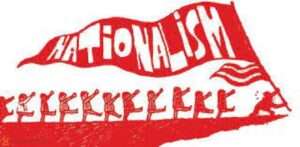The Volokh Conspiracy
Mostly law professors | Sometimes contrarian | Often libertarian | Always independent
Trump's Acquisition of Stake in Intel Highlights Similiarities Between Right-Wing Nationalist and Left-Wing Socialist Economic Policies
Both are prone to promoting government planning and control of the economy, and both have common flaws.

Donald Trump's acquisition of a 10% federal government stake in Intel, a major electronics firm, is an example of the dangerous similarities between right-wing nationalist and left-wing socialist economic policies. Both favor extensive government control, direction, and - as in this case - even ownership of industry. As Reason's Eric Boehm points out, the idea of US government ownership of major computer chip manufacturers was previously advanced by socialist Senator Bernie Sanders. More generally, Steven Greenhut notes, "MAGA's 'right-wing' policies sometimes seem indistinguishable from left-wing ones." Government control of the economy is central to Trump's massive imposition of new tariffs, his immigration restrictions, and more.
In our 2024 article "The Case Against Nationalism," my Cato Institute colleague Alex Nowrasteh outline a wide range of similarities between nationalist and socialist economic policies, and also explained how they have common flaws:
Nationalists in the United States and elsewhere advocate wide-ranging government control of the economy, most notably in the form of industrial policy, protectionism, and immigration restrictionism. In this respect, the nationalism of the right has much in common with the socialism of the left. It's no accident that the more extreme early 20th-century nationalists, such as the Nazis and Italian fascists, explicitly sought to appropriate socialist economic policies for purposes of helping their preferred ethnic groups, as opposed to the more expressly universalist objectives of left-wing socialists. It should not, therefore, be surprising that nationalist economic policies have many of the same flaws as their socialist counterparts…
Given the overlap between nationalism and socialism, it should not be surprising that their economic policies have many of the same pitfalls. The most significant are knowledge problems and perverse incentives arising from dangerous concentrations of power.
During the mid-20th century, Nobel Prize-winning economist Friedrich Hayek famously argued that socialism cannot work because central planners lack the knowledge needed to determine which goods to produce and in what quantities — a concept commonly referred to as the "knowledge problem." Market prices, he argued, enable producers to know the relative value of different goods and services, and to determine how much consumers value their products.
Nationalist economic planners, like their socialist counterparts, have no way of knowing this information. They also have no good way of determining which industries government should promote and how much it should promote them….
For these reasons, nationalist economic planning has produced poverty and stagnation — much like its socialist counterpart. Such were the results in nations like Argentina (where nationalism wrecked one of Latin America's most successful economies), Spain, and Portugal under their nationalist regimes.
As for the incentive problem, nationalist economic policy — like socialism — requires concentrated government power. Only thus can politicians and bureaucrats promote their favored industries, exclude foreign goods and workers, and so on. Yet government actors are not disciplined by market prices, nor are they incentivized to seek profit by satisfying consumers like firms in the private sector. They are instead guided by the demands of political leaders and direct their energies toward pleasing state authorities, who increasingly control the purse strings….
Nationalism does not resolve the knowledge or incentive problems that undermine socialism; government-dominated economies have the same deficiencies regardless of whether the state swears allegiance to a mythical international proletariat, an ethno-cultural group, or a leader who supposedly embodies its culture and virtues… Depending on the degree of state control of the economy, the results may include mismanagement, cronyism, and economic ossification. Nationalism is no substitute for market prices and incentives.
As Alex likes to put it, nationalism is socialism with different flags, and more ethnic chauvinism.
Obviously, we are not the first to point out the similarities between nationalism and socialism. The great libertarian economist F.A. Hayek warned about the same tendency in his 1960 essay "Why I am Not a Conservative":
[T]his nationalistic bias… frequently provides the bridge from conservatism to
collectivism: to think in terms of "our" industry or resource is only a short step away
from demanding that these national assets be directed in the national interest.
Not all conservatives are nationalistic in this way. Those who are not would do well to condemn right-wing central planning of the economy no less than the left-wing version. Both are harmful and dangerous, for many of the same reasons.
In addition to it similarities with socialism, nationalist ideology also poses some distinct dangers of its own, such as promoting ethnic bigotry and xenophobia and undermining democratic institutions in ways somewhat different from those characteristic of socialism. Nowrasteh and I cover them in some detail in other parts of our article.


Show Comments (122)